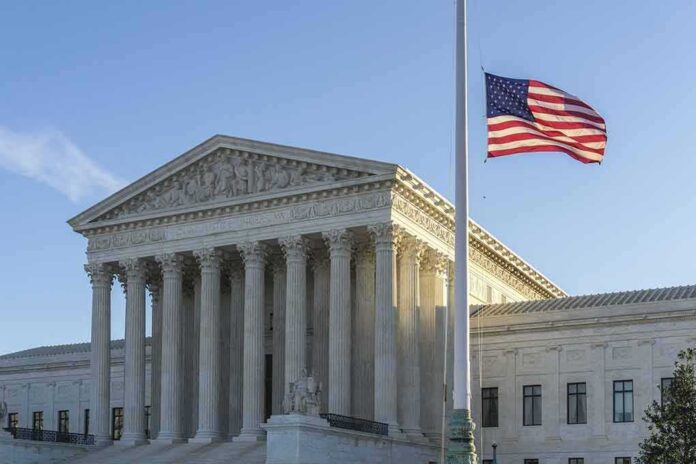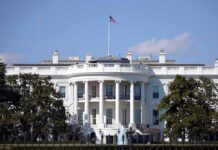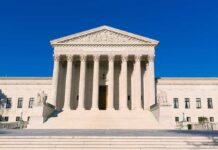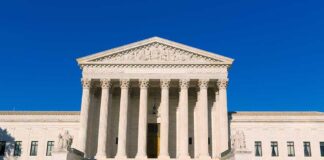
Chief Justice John Roberts delivers a rare rebuke of Trump’s push to impeach federal judges, setting a clear line between judicial independence and political vendettas.
Quick Takes
- Chief Justice Roberts stated that impeaching federal judges is inappropriate for disagreeing with their rulings.
- Roberts’ comments were a direct response to President Trump’s call to impeach a federal judge over a Venezuela deportation order.
- The Trump administration proceeded with deportation flights despite the judge’s order, claiming it was issued after planes left U.S. airspace.
- Roberts emphasized that the appellate review process is the proper channel for addressing judicial disagreements.
- This marks a significant moment reminiscent of Roberts’ 2018 defense of judicial independence against Trump’s criticisms.
Roberts Takes Firm Stand Against Judicial Impeachment Threats
Chief Justice John Roberts took an extraordinary step to defend the federal judiciary on Tuesday, issuing a direct response to President Donald Trump’s calls to impeach a federal judge who ruled against his administration in an immigration case. Roberts’ statement comes after Trump publicly suggested impeachment for U.S. District Judge Amit Mehta, who had ordered a halt to deportation flights of Venezuelan migrants. The Chief Justice’s intervention represents a rare moment when the typically reserved leader of the Supreme Court has publicly entered a political controversy to defend judicial independence.
“Threats of impeachment based on the merits of judicial decisions are not proper,” Roberts declared in his statement. “The appropriate way to address a disagreement with a judicial ruling is to appeal it.” Roberts’ public rebuke of Trump’s rhetoric underscores the growing tension between the judicial branch and political forces seeking to influence or undermine court decisions. As conservative lawmakers increasingly scrutinize judicial rulings unfavorable to their agenda, Roberts’ intervention seeks to reinforce the constitutional separation of powers that has defined American democracy.
Rare statement by Chief Justice John Roberts h/t @MelissaQuinn97
"For more than two centuries, it has been established that impeachment is not an appropriate response to disagreement concerning a judicial decision. The normal appellate review process exists for that purpose." https://t.co/rA0ViPoE55
— Natalie Brand (@NatalieABrand) March 18, 2025
Venezuela Deportation Case Ignites Constitutional Showdown
The controversy began when Judge Mehta issued an emergency order to halt deportation flights carrying Venezuelan migrants back to their home country. The Department of Homeland Security, however, proceeded with the flights, arguing that Judge Mehta’s ruling came after the aircraft had already departed U.S. airspace. This technical argument has raised significant questions about the extent of judicial authority over executive branch actions and the proper interpretation of court jurisdiction in international transit cases.
The case has quickly escalated beyond a simple policy dispute. Republican Representative Andy Biggs of Arizona introduced articles of impeachment against Judge Mehta, directly following Trump’s suggestion. Meanwhile, Elon Musk, a prominent Trump ally and advisor on government efficiency, endorsed the impeachment effort, calling it “necessary.” The rapid mobilization to impeach a federal judge over a specific ruling represents precisely the type of politicization of the judiciary that Roberts appears determined to prevent.
A Pattern of Defending Judicial Independence
This is not the first time Chief Justice Roberts has publicly defended the judiciary against Trump’s criticisms. In 2018, Roberts issued a similar statement after Trump criticized a ruling by an “Obama judge.” At that time, Roberts emphasized that “We do not have Obama judges or Trump judges, Bush judges or Clinton judges.” His consistent defense of judicial independence across different administrations suggests a principled stance rather than partisan positioning, though his intervention comes at a particularly sensitive moment in American politics.
The current controversy highlights the fragile balance between the three branches of government. The Constitution established impeachment as a remedy for “high crimes and misdemeanors,” not as a mechanism to override unfavorable judicial decisions. Roberts’ statement serves as a measured but firm reminder that the judiciary’s independence is a cornerstone of constitutional governance, not a political convenience to be discarded when rulings prove unpopular with those in power.
Implications for Future Judicial-Executive Relations
As immigration continues to be a flashpoint in American politics, further legal challenges to executive enforcement actions are inevitable. Many cases similar to the Venezuela deportation dispute will likely make their way through the federal court system, with some potentially reaching the Supreme Court itself. Roberts’ public statement signals to lower court judges that the highest court in the land recognizes their authority to issue rulings without fear of political retribution.
For conservative Americans who value constitutional order and separation of powers, Roberts’ intervention serves as an important reminder that even in highly charged political environments, the judiciary must remain an independent arbiter of law rather than an extension of political will. The ongoing tension between judicial independence and executive authority will continue to shape the constitutional landscape as America navigates increasingly complex political waters, with Chief Justice Roberts positioned as a key defender of institutional boundaries.
Sources:
US Chief Justice Roberts rebukes Trump’s attack on judge
Chief Justice Roberts Rebukes Trump Call to Impeach Judges for Rulings
Justice Roberts rebukes Trump’s call to impeach Venezuela deportation case judge
























